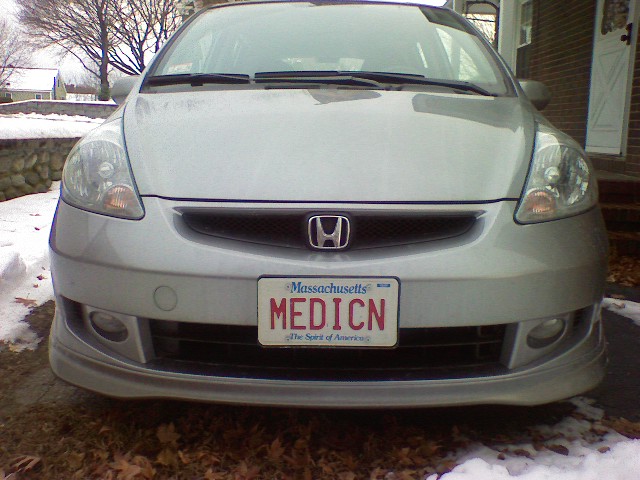Hard to read, but it says “GTFO” — an acronym for “Get the Fuck Out”.

Part one of my license plate special series. I took all of the pictures myself in my travels.
Some thoughts on vanity license plate density.
Enjoy.
Hard to read, but it says “GTFO” — an acronym for “Get the Fuck Out”.

Part one of my license plate special series. I took all of the pictures myself in my travels.
Some thoughts on vanity license plate density.
Enjoy.

Part one of my license plate special series. I took all of the pictures myself in my travels.
Some thoughts on vanity license plate density.
Enjoy.
Spotted in the wild:


:ninja:
One of my people — we’ll call her Jane — takes two drugs. A generic SSRI, and Nexium. While sorting through the options available to her, and running two scenarios, I discovered just how much Nexium costs her per year. More specifically, how much money she will save by switching from 40mg of Nexium to 2x20mg omeprazole capsules.
$594 per year.
I asked Jane if she’d ever taken anything before the Nexium, because it looked to me like she started it in early 2006, and she told me that she hadn’t. The doctor had given her samples, and then a prescription, and she’d been taking it ever since.
Here’s the thing: Nexium isn’t better than Prilosec. Yes, we all know it’s the isolated, active enantiomer of omeprazole, and its time to acid drop is a bit better, and “studies” (paid for by AstraZeneca) have shown that Nexium beats Prilosec in squashing acid production.
Except that it doesn’t, because if you look at the fine print, you’ll see that those glossy, purty brochures that the big-titted drug reps bring you compare 40mg Nexium to 20mg Prilosec. In fact, when AZ did studies comparing 40mg to 40mg, they discovered that the difference was inconsequential, so they didn’t include those results in their marketing materials. (My source for this is a former sales manager for AZ who used to have Nexium as a drug, and then went on to be a regional drug rep manager. He’s with Forest now.)
Pretty slick. And underhanded.
Oh, and time to acid drop isn’t a particularly important metric, by the way, because PPIs are maintenance meds, not Tums. And Nexium was only something like 2% better than Prilosec for the 8% of the study participants that even showed a difference. Whoopty-do. Clinically significant? Not especially.
Back to saving money. By changing from Nexium to Prilosec, Jane is able to pick a different Part D plan that has a lower premium, not to mention that when she comes to the pharmacy, her copayment will be lower, too. So Jane will be switching. And she could probably eke out a few more dollars in savings if she tried just 20mg omeprazole daily, but I thought I’d be generous by allowing for a non-standard dose in my calculations so her doctor would feel better about switching.
There is a tiny, tiny percentage of people — less than 1 in 100 — that do not respond to omeprazole that do respond to esomeprazole. No one knows why this is, and simply changing from one to the other results in marked improvement. That is no excuse for reaching right for the Nexium over the omeprazole, because sometimes the reverse is true: omeprazole works when esomeprazole does not. Sometimes neither of them work and you need to pick a different drug altogether. This phenomenon is true across all drug classes, and is another reason that having an inflexible, national formulary is a BAD idea.
[tags]healthcare, inefficiency[/tags]
Jay Parkinson has a nifty section of his blog where he details the money he has saved his patients. The timeframe spans one month (October). His total is $9,672. Pretty nice; I’ll be watching to see what else you do.
I can speak for pharmacists, technicians, and patients when I say that its really, really nice to see a doctor doing the research to find out how much drugs actually cost. I see so much healthcare inefficiency on a daily basis just as it relates to drug therapy, it makes me want to start knocking heads together. Prescribers going right for the Nexium or Prevacid without EVER trying omeprazole; Lipitor when simvastatin is just as effective and has never been tried; Lescol XL, when pravastatin has never been tried; Avodart when finasteride has never been tried. Right for the ARB when an ACEi has never been tried.
Look, I don’t give a fuck what your pet drug is. I don’t give a damn what the drug rep shoves under your nose on a weekly basis. I don’t care that you’re unaware of the top-of-mind marketing that’s being used on you without your knowledge or consent.
If it’s going to cost an elderly person on a fixed income an extra $594/year because you “like it better”, you need an ass-kicking.
And so on. I’m all for moving from one drug to another if a less expensive drug has been tried and has failed. That makes sense. But the absolute waste of money because less expensive alternatives have never been tried boggles my mind. I can truly understand why prior authorizations were invented, even if I curse them daily for wasting minutes of my precious time.
Back to the topic at hand: this time of year, people make appointments to see me, where we sit down(!), chat, review medications, and then we talk about what can be done for 2008. Most people that see me are happy with their drug therapy, except for one thing: it costs too much. The goal of their visit is to reduce the cost of their drug therapy for 2008, every single time. Without fail.
I have seen 7 people across two days. (An average appointment lasts about 45 minutes.) In that time, I have saved patients $11,831. That’s an average inefficiency of ~$1700 per person. And these are people with drug coverage. The single highest total for one person was ~$3600/year.
In the next couple of days, I’ll try to share some scenarios so you can see how much just one simple switch can save an average person.
Keep up the good work, Jay. Seriously. Pharmacists, technicians, and patients everywhere applaud your good sense and efforts.
[tags]healthcare, inefficiency[/tags]
Phone rings. “Hello, may I help you?”
“Hi, I was wondering if I can take an Aleve for my shoulder ache? I also take lisinopril.”
7 years ago:
WTF is lisinopril?
Time: instantaneous
6 years ago:
I know how to spell lisinopril!
Time: ~0.5 seconds
5 years ago:
Lisinopril is for blood pressure!
Time: ~1-2 seconds
4 years ago:
Have I seen this before? Yes… I have because Aleve is naproxen sodium, and I’ve seen people take Naprosyn with lisinopril.
Time: ~2-3 seconds
3 years ago:
Lisinopril is an ACE inhibitor, and I see this combination every day.
“Sure, that’s fine.”
Time: ~0.75 seconds
2 years ago:
*Visual, mental review of systems, picturing the RAAS pathway and envisioning how naproxen is metabolized to see where and how the two intersect.*
“Sure, that’s fine.”
Time: ~0.5 seconds or so
Most recently:
How old is she? What’s her creatinine clearance? Might she be better off with diclofenac or celecoxib? Eh, it’s probably okay on a short-term basis, and it’s not a terrible choice, but it’s probably not the best choice, either.
“Sure, that’s fine.”
Time: ~1-2 seconds
What’s the next step, I wonder? Quicker processing? Maybe. Deeper comprehension? Hopefully.
This development of thought processes is the difference between these two residents. The ability to take in a situation in its entirety, process it efficiently, while remaining calm and friendly takes time and exposure, and has very little to do with intelligence or any other innate quality.
* Naproxen is considered an unacceptable agent in geriatric patients even though it is used in the elderly pretty regularly. (My grandmother, for instance.) Probably because most internists, orthopods, and others are often not terribly familiar with geropharmacology, which is why geriatrics is its own specialty both in Medicine and Pharmacy.
So we’re in the open enrollment period for Medicare Part D. It started on November 15, and it ends on December 31. I’ve been doing consulting twice a week, and the scramble is in full effect. While I do quite a bit more than plunk in drugs and quantities for my consulting, there is one tool that is the backbone of what I do when running various scenarios. It’s the Medicare.gov plan finder.
This guide does not apply if you have a hybrid medicaid-medicare plan through your state. Those folks know who they are, and if you have no idea what I’m talking about, you don’t need to worry about it.
Before you begin you’ll need three things:
Here’s a walk-through, so you’ll want to open the link in a new window or tab…
Continue reading How-To: Find the best Medicare Part D prescription drug plan
Two recent posts of mine have dealt with bad information, and both times I’ve wondered what the accepted protocol is for addressing it. Obviously “Hey dumbass, go read some medical literature,” doesn’t cut it. I addressed one instance — the cholesterol one — quietly, after it happened. It wasn’t life-threatening misinformation, so immediate intervention didn’t seem necessary.
I didn’t bother to say anything about the antibiotic shenanigans.
The trouble with this is addressing something someone does without stepping on their toes. If I do something stupid, I’d like someone to smack me upside the head and tell me I’m wrong. Pussyfooting around the issue is for people with no self-confidence. I don’t have that problem — after all, I write on the Intarweb, and think people actually care about what I have to say, don’t I? ;) — so just come right out and tell me I’m wrong.*
Not everyone is that resilient, however, and I’m sensitive to this.
Recently I’ve heard a pharmacist say she was going to take lots of Vitamin C and echinacea to get over a cold. I’ve seen pharmacists recommend Airborne for cold on more than one occasion. I’ve heard a pharmacist recommend a homeopathic remedy for migraine. I said nothing — these suggestions aren’t harmful, but they certainly aren’t helpful, either. In these cases, it’s just not worth the effort. Besides, Father Time and the body’s own defenses will clear these problems up on their own. (And in the case of the migraine, I suspect it was psychosomatic anyway.)
When someone says something boneheaded to a patient, how do you handle it? Especially if it’s a pharmacist colleague? I would imagine doctors and nurses run into this problem from time to time as well, even if they practice alone now.
* I’m happy to say that this hasn’t happened in a very long time, which can be viewed as either a good thing (I’m SMRT!) or a bad thing (I work with a bunch of idiots). Which one I lean towards is dependent on where and who I am working with, naturally.
I hear some wacky stuff come out of the mouths of pharmacists sometimes, and it makes me sad, because they should know better. One recent gem, said to a technician was “Well Zithromax doesn’t actually kill the infection. It’s a bacteriostatic drug, so it doesn’t really do anything. Why waste your money? Amoxicillin’s the same way.”
My blood pressure went up a few points — at least they didn’t say it to a patient.
Bacteriostatic doesn’t mean that it doesn’t work. It also doesn’t mean that you’d be just as well off taking sugar pills. In fact, there are relatively few bactericidal drugs out there, and most of them are the nuclear bombs of the antibacterials: fluouroquinolones, vanco, rifampin, linezolid, and so on. The majority of oral antibiotics that are filled on a daily basis are, in fact, bacteriostatic.
And guess what? It doesn’t matter. Bacteriostatic drugs hold the infection in check while the immune system clears it out. I thought this was common knowledge; I guess I was wrong. Of course there are instances when this isn’t good enough. Those are the minority of circumstances, however. Infections don’t usually need to be killed. That’s why we have an immune system.
Research from the Nestlé Research Center in Switzerland and published in the Journal of Proteome Research.
In a clinical trial made up of 22 men, half of which described themselves as “chocolate lovers” while the other half were “chocolate indifferent,” participants ate chocolate or placebo over a five-day period. During this time, their blood and urine was monitored for various metabolite levels. The researchers found a “hallmark” profile in the men who described themselves as chocolate lovers: low levels of LDL-cholesterol and slightly raised levels of albumin protein. The same levels were found in the chocolate lovers even when they ate no chocolate. The researchers also noted that the activity of the gut microbes of chocolate lovers was distinctively different from the other subjects.
(They should have used women. :haw: )
But seriously… what the heck is a chocolate placebo? Wouldn’t you know that you’re not eating chocolate?